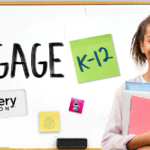The following is an excerpt from Lance Rougeux’s interview with our publisher (and host of Education Talk Radio) Larry Jacobs on February 19, 2020.
Lance, could you tell readers a little bit about your background and current role at Discovery Education?
Sure, Larry! I started my career as a middle school teacher in the School District of Philadelphia’s Julia de Burgos Bilingual Middle School, which is located not far from Temple University in North Philly. From there, I moved to Office of Educational Technology at the Pennsylvania Department of Education, where I helped start a statewide professional learning network called Keystones: Technology Integrators (KTI). After a couple of years in Pennsylvania’s Department of Education, I joined Discovery Education.
Over my last 15 years at Discovery Education, I’ve helped support and grow our professional learning network, the Discovery Educator Network, which is also known as the DEN. Since then, I’ve been proud to be part of an amazing team that has built one of the largest professional learning networks of its kind. Most recently, I added the management of our new Customer Advocacy team to my responsibilities. The primary job of our Customer Advocacy team is to make sure that when Discovery Education creates initiatives and services, the educators’ input is guiding that process.
Can you talk a little more about the Discovery Educator Network or DEN? When was it formed, who can participate, and what does it do?
The DEN was formed during the 2005 ISTE Conference. The small group of dynamic educators who formed the DEN began, at first, to use some of the emerging social media tools available to connect with each other so that they could share the tips, tricks, and strategies they were learning and developing for integrating Discovery Education’s digital content into classroom instruction. I think our mission statement, which we haven’t waivered from in 15 years, really explains simply what we do. That statement is: The Discovery Educator Network seeks to connect educators to their most valuable resource, each other.
We want the DEN to be an inclusive organization that is accessible to all. So, very early on in the DEN’s history we determined that while we will offer additional benefits and resources for members of the DEN who use Discovery Education services, the vast majority of the DEN’s events and resources will be available to any educator who wants to learn, share, and grow with our community.
The DEN, like many other PLNs, gives educators a place to find resources from other teachers and learn innovative new approaches to teaching and learning they can use in their classrooms. Through the DEN, you can access a creative idea or resource, use it in your classroom tomorrow, and it saves you time and helps you grow in some way in your instructional practice. But what I really believe the DEN offers is inspiration. So many teachers are looking to try something new or put a different spin on a lesson, but there are a lot of things in the way. Time. Policy. Fear. We do our best to make it known that all teachers are invited to be part of the community and we want to celebrate and elevate the work they do. It doesn’t matter if it’s a first-year teacher trying something for the first time or a seasoned veteran sharing something he or she’s done for years. The act of sharing with each other inspires the recipients to think differently, reflect on their own practice, and take risks.
I think it is well known that professional development is critical to learning initiatives like a digital transition, but we also know that sometimes the dollars needed for an in-depth professional learning initiative to support such an effort are not available. How do professional learning networks like the DEN make professional learning accessible to all educators?
I think we can all agree that when a school system wants to implement a big learning initiative, a companion professional learning effort that helps educators evolve their instruction to support that initiative is crucial.
But let’s be honest—sometimes, the optimal level of PD needed to support a new learning initiative just does not materialize. That’s where a professional learning network like the DEN can step in. The DEN makes a base level of PD accessible to all learners by expanding each members’ network of peers. You see, no matter what initiative you are working on or what challenge you are facing, someone in a professional learning network like the DEN has seen some variation of that issue and can offer some direction and support. If an educator needs help using digital content to support literacy in elementary science instruction, or if a teacher is looking for new strategies to integrate virtual field trips into high school history classes, a good professional learning network will point a member in the right direction.
Now, I want to be crystal clear here—a professional learning network does not provide the tailored support a school district needs to drive a new learning initiative. But, a professional learning network provides members access to a level of sustained advice, feedback and inspiration to educators where the rubber hits the road: the classroom.
What are the benefits to teachers of participating in a professional learning network?
Well, I look at it like this: We know that differentiating instruction for students is critical, and educators are continuously challenged to engage all learners. The same holds true for adult educators. Adult learners need personalized, differentiated professional learning as well.
I think access to a source of personalized, differentiated professional learning is a key benefit of participating in a professional learning network. Educators participating in PLNs are empowered to take ownership of their professional growth and personalize their learning pathway. Through the input of like-minded colleagues, PLN participants access a range of new perspectives that can help them approach their work in innovative ways that also benefit students.
I think the second biggest benefit is flexibility. In a PLN, you have the option to try things out. If begin to explore a topic then find that it is really not as interesting as you thought it would be, well, you can easily shift gears and begin to explore something else. I think this ease of use helps trying new things really easy.
How do schools and school districts benefit from their teachers’ participation in professional learning networks?
Think about the collective knowledge gained when teachers within a building take time to share what is working for them with their colleagues. And then think about the body of knowledge that is developed when all teachers across a school district come together to share lesson ideas that worked for them.
Now, expand that group to include teachers across your state, around the country, and all over the world. Schools and districts who actively encourage their teachers to participate in PLNs develop a teaching staff that is accessing and applying best practices from a global audience. When teachers participate in a professional learning network, they broaden their school and district’s body of knowledge to the benefit of everyone.
What are some tips for teachers just beginning to participate in a professional learning network?
Great question! Here are three quick answers:
- Take time to reflect upon what you want to learn more about or do better in your classroom and then seek out a PLN that shares your goals
- Don’t be afraid to share. Over many years I’ve found that most teachers are not predisposed to share what they are doing, but they really want to learn about what other teachers are doing. The reality is that we all have something to share that will support and even inspire someone else’s professional growth.
- Make it personal. It’s about professional learning, but it’s for your growth.
Where can educators go to learn more about Discovery Education’s professional learning network?
If you are using Discovery Education Experience, you can learn more our professional learning network the DEN through a newly launched, curated channel of content featuring lesson ideas and resources shared by community members. But, if you are not on Discovery Education Experience you can get started by visiting the Discovery Education Twitter page @discoveryed or the DEN Facebook friends page.
The American Consortium for Equity in Education, publisher of the "Equity & Access" journal, celebrates and connects the educators, associations, community partners and industry leaders who are working to solve problems and create a more equitable environment for historically underserved pre K-12 students throughout the United States.
- American Consortium for Equity in Educationhttps://ace-ed.org/author/admin/
- American Consortium for Equity in Educationhttps://ace-ed.org/author/admin/April 23, 2025
- American Consortium for Equity in Educationhttps://ace-ed.org/author/admin/
- American Consortium for Equity in Educationhttps://ace-ed.org/author/admin/







